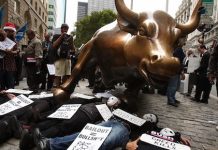
Trump and the Republicans have now launched an initiative to water down another post-financial crisis regulation, the Volcker Rule, put in place to reduce banks’ speculative investments with depositors’ money. The Federal Reserve, along with four other federal agencies, have proposed changes to undermine the Volcker Rule. The rule, named for former Federal Reserve Chair Paul Volcker, has been criticized by Wall Street asburdensome and harmful. Between The Lines’ Scott Harris spoke with Bartlett Naylor, financial policy advocate with Public Citizen, who discusses the danger he sees in the weakening of the Volcker Rule and the Trump/GOP deregulation of the U.S. banking system.
BARTLETT NAYLOR: Paul Volcker had this simple idea that everyone, including bankers agree with, that you shouldn’t take government-backed taxpayer-backed deposits which are cheap and abundant – how much do you get paid on your checking account – and use them for speculation. It should be used in a bank for making (unintelligible) loans to businesses and consumers. And he had that idea following the financial crisis, where a bunch of these speculative bets exploded into the cataclysm that we know is the 2008 financial crisis. And it became the Volcker Rule.
I think it would be useful to talk about how the Volcker Rule fits in with the overall Dodd-Frank banking regulations that came into force years after the 2008 financial crisis and rules that have since now – under the Republican Congress and under President Trump – have been diluted to a great extent. But tell us about the key role of the Volcker Rule during the post-crisis years.
BARTLETT NAYLOR: The 2010 Dodd-Frank law has about 400 separate rules in them. Most conspicuous are the rules contained in Title 10, which create the Consumer Financial Protection Bureau. There are many reasons that caused the housing bubble and crash, but one of them was unbridled predatory lending. And so what’s (been) created was an entirely new agency, the Consumer Protection Bureau to protect against predatory lending that essentially led to this housing bubble. Within the other parts of the law were issues addressing systemic risk. That is to say banks were engaged in reckless activities. One of which was speculation using the bank’s own money to make bets on a variety of things. Obtuse, complex derivatives, purchasing credit default swaps. Today, we talk about bitcoin and so forth. And in response to that, Section 619, the Volcker Rule, is one of those 400 rules that Congress enacted and while it’s only I would say 600 words long in statute, the first rule that was finalized in 2013 absorbs more than 1,000 pages double-spaced and it’s that 2013 rule that’s being replaced by this current proposal.
BETWEEN THE LINES: I wanted to ask you what the danger is here. I’ve read summaries of the proposal to change the Volcker Rule and it looks like they’re attempting to break up financial institutions and banks into two groups: large banks and small and medium banks, and saying that the Volcker Rule will still apply to the larger banks, but they’re going to loosen restrictions on investments and speculation with the small and medium banks. What’s the danger here in your view?
BARTLETT NAYLOR: JP Morgan lost $5 billion or so dollars in a few years and what’s summarized as the London Whale episode, claiming it was a hedge. In fact, it was a directional bet and when the market learned about that and learned in fact the CEO’s inability to understand that, they discounted JP Morgan stock by nearly 30 percent. That’s the danger – that these bets can go wrong and one must understand that banks are highly leveraged. That is to say for whatever they do, they’re borrowing most of the money to do it.
In other words, for every $100 that JP Morgan has put out in a loan, it borrowed $95 to do that, so somehow if that loan or that effort by JP Morgan is five percent off, JP Morgan or that bank is insolvent, loans don’t go bad quickly. One, if your sales are off for that factory that you’ve built with borrowed money that often happens slowly. But a bet can go bad badly. So with speculation, if you lose a bet, you can wipe out the bank’s capital. That is the difference between assets and liabilities and so the Volcker Rule is not only to protect the taxpayer subsidy for gambling, it’s meant to protect the system and from bailouts generally.
Not only do we need to have a strong Volcker Rule, not a diluted Volcker Rule, we really need to separate banks in two completely different types of business. If you’re going to have FDIC insurance, you should be completely limited in what you do with that to make business loans and consumer loans. If you want to speculate, if you want to make bets on bitcoin or engage in derivatives, you should be something completely different. An investment bank gets your money from other investors borrowed from the bond market. This is known as restoring Glass Steagall. This is the 1933 deal that both established FDIC insurance and separated commercial and investment banking, that was repealed by regulatory fiat formally in 1999 and it was less than a decade later that we had the eruption in 2008. That’s what’s really needed.
The Volcker Rule is an important step, but rather than watering it down, Congress really needs to pass Glass-Steagall. And interestingly enough, that was provided in their platforms in both the Democratic Party and the Republican Party. Unfortunately, Trump has proved that he is going in a very different direction.




